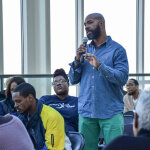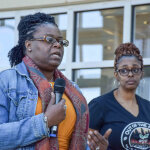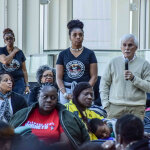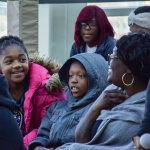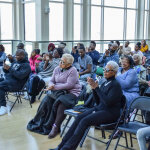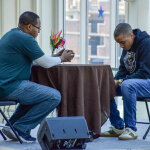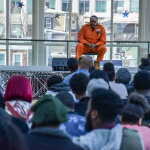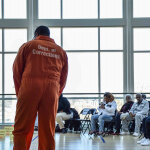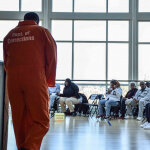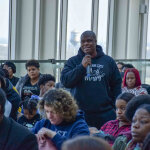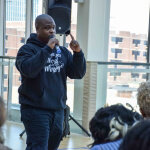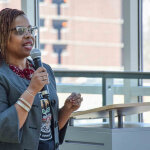Out of the Ashes; Surviving Mass Incarceration
March 12, 2019
By: Briana Harris | @brikeey
Over the weekend Wilmington’s KUUMBA Academy Charter School partnered with Out of the Ashes; a fatherhood and family restoration organization aimed toward healing those who have been affected by mass incarceration and the prison reform system. The organization was founded in 2015 by real-life father and son duo, Coley Harris and Ahmarr Melton who experienced firsthand what many other families struggle through—trauma caused by detachment via imprisonment. Harris and Melton pride themselves on being walking testimonies of what it looks like to not only overcome systematic oppression but more importantly what it looks like to maintain a flourishing family dynamic following emotional warfare.
To give back to the very community that once stood beside them in full support, Harris, and Melton share with the public what they’ve learned during this process via a stage play they call Out of the Ashes; Where A Seed Finds Life. The play, which is described as ‘drama therapy,’ is an authentic presentation following the true story of the trials and tribulations faced as Harris and Melton worked to build a relationship after a 14-year prison sentence.
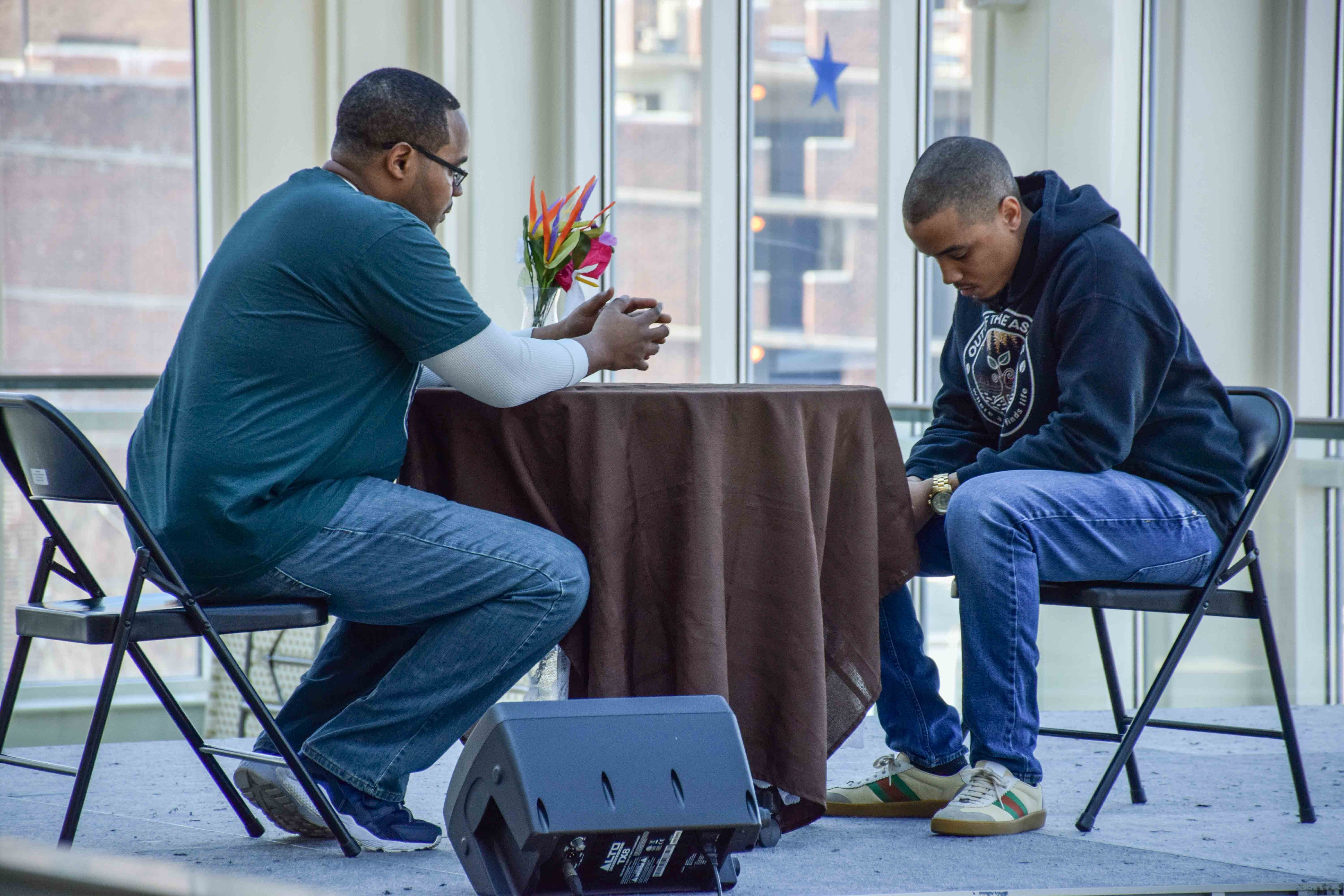
Coley Harris (left) and Ahmarr (right) perform their play entitled “Out of the Ashes” at Kuumba Academy in Wilmington, Delaware Photo By Wendell Raulston
A panel of speakers, some victims and others, allies of the cause, were in attendance to share the details of their personal relationship with mass incarceration. To kick off the discussion, social activist and guest keynote speaker Tony Lewis Jr. recited a slew of statistics, some that included numbers such as more than 2.7 million children in the United States have an incarcerated parent. Of them, 1 in 9 are African American, 1 in 28 are Hispanic, and 1 in 57 are white. The numbers were astonishing but helped open eyes to see how much of an affect imprisonment has taken on the racial demographic groups that make up much of Wilmington’s community.
Lewis went on to share his own story revealing that he too had been a child robbed of his father, who to this day is still serving his sentence. Despite the physical disconnect, Lewis expressed that he manages to find positive parts intertwined within this negative situation.
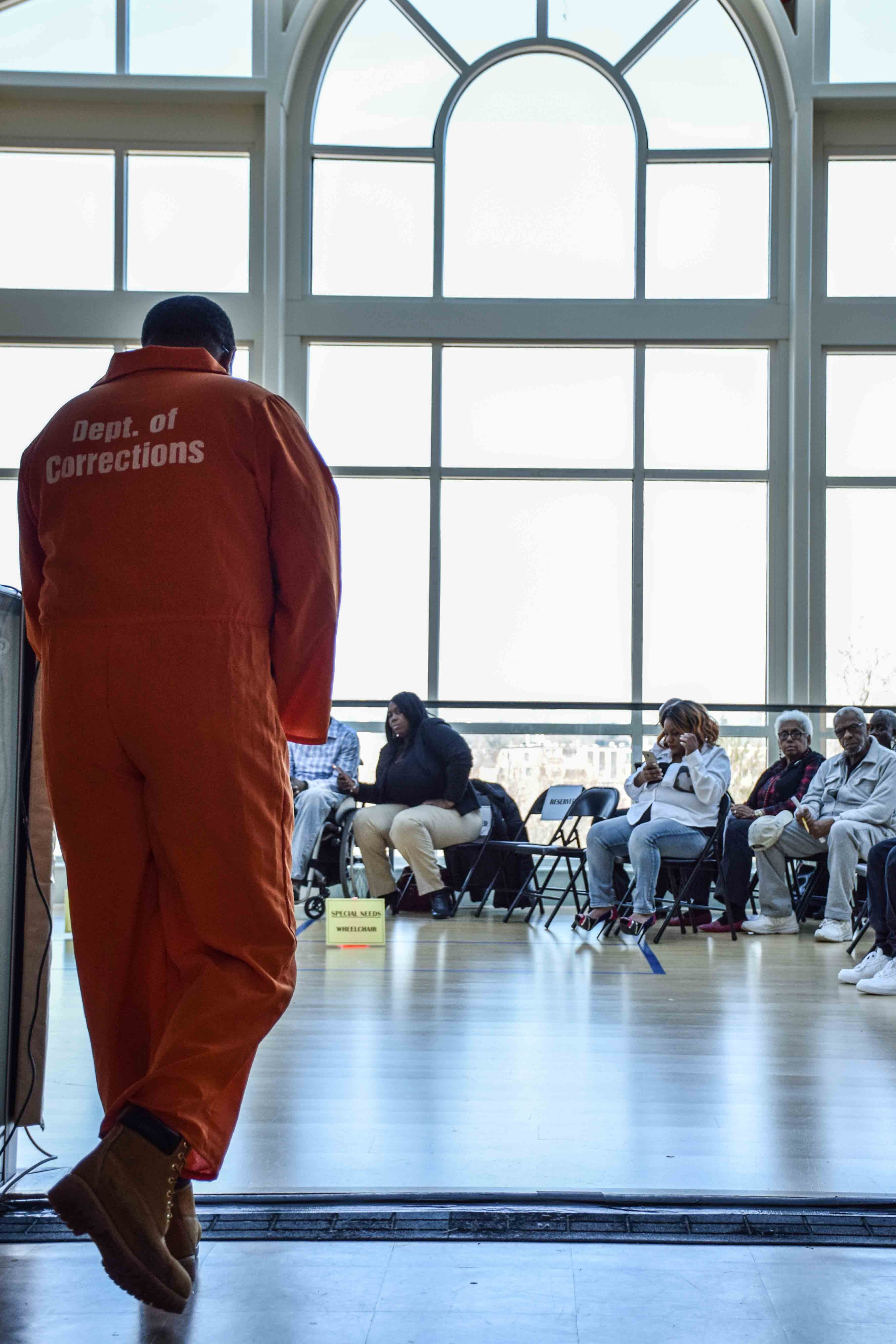
Out of the Ashes held “Surviving Mass Incarceration” Panel Discussion Event at Kuumba Academy in Wilmington, Delaware Photo By Wendell Raulston
“Don’t ever close yourself off to an incarcerated parent,” says Lewis. “My father has been away for nearly my entire life but he’s acted as a guiding light for me. His position has shown me what unconditional love looks like and has taught me what not to do. He’s helped teach me to be better,” Lewis continued.
This was something that Melton could relate to. During the performance, a line recited seemed to have pulled at the heartstrings of many in the audience. As Melton’s character reminisced on his past with an absent father, he chose to be hopeful and refocused his attention on their future as he let out “my dad isn’t perfect, but his love for me is.” When asked to elaborate after the performance, Melton said “as children, we all look up to our parents as superheroes but holding someone in such high regard can often cause disappointment. For a relationship to manifest in a healthy manner, you have to accept that no one is perfect. As I got older, I learned that like me, my dad is human…and although he’s made mistakes, it was important to understand that his love for me had in no way been faulted.”

Ahmarr delivers monologue during play entitled “Out of the Ashes” at Kuumba Academy in Wilmington, Delaware. Photo By Wendell Raulston
When asked to describe the concept behind drama therapy, Melton says that “it’s our primary intervention tool because it’s a more effective way to connect to our audience. Sitting down and listening to a panel doesn’t always bridge the gap, so starting these types of tough conversations in the form of entertainment is less intimidating and allows for people to relate enough in order to start the process of healing.”
In a panel discussion, Melton described his childhood as one with hardships. Although he had a loving family, he found himself searching for answers that only a father could provide. The everyday growing pains of an adolescent boy, such as topics pertaining to sports and girls became a bit tougher to manage. Melton argues that without proper guidance, little issues such as these have the potential to manifest into the bigger problems that many inner-city young men find themselves suffering through. Melton’s father Coley agreed, and chimed into the conversation by saying “as a black man you can bare a thousand psychological hardships, but don’t you dare hug your father, your son, your uncle…or you’ll come across as weak.” With power in his voice he said “that has to change; we have to give our men the courage to feel!”
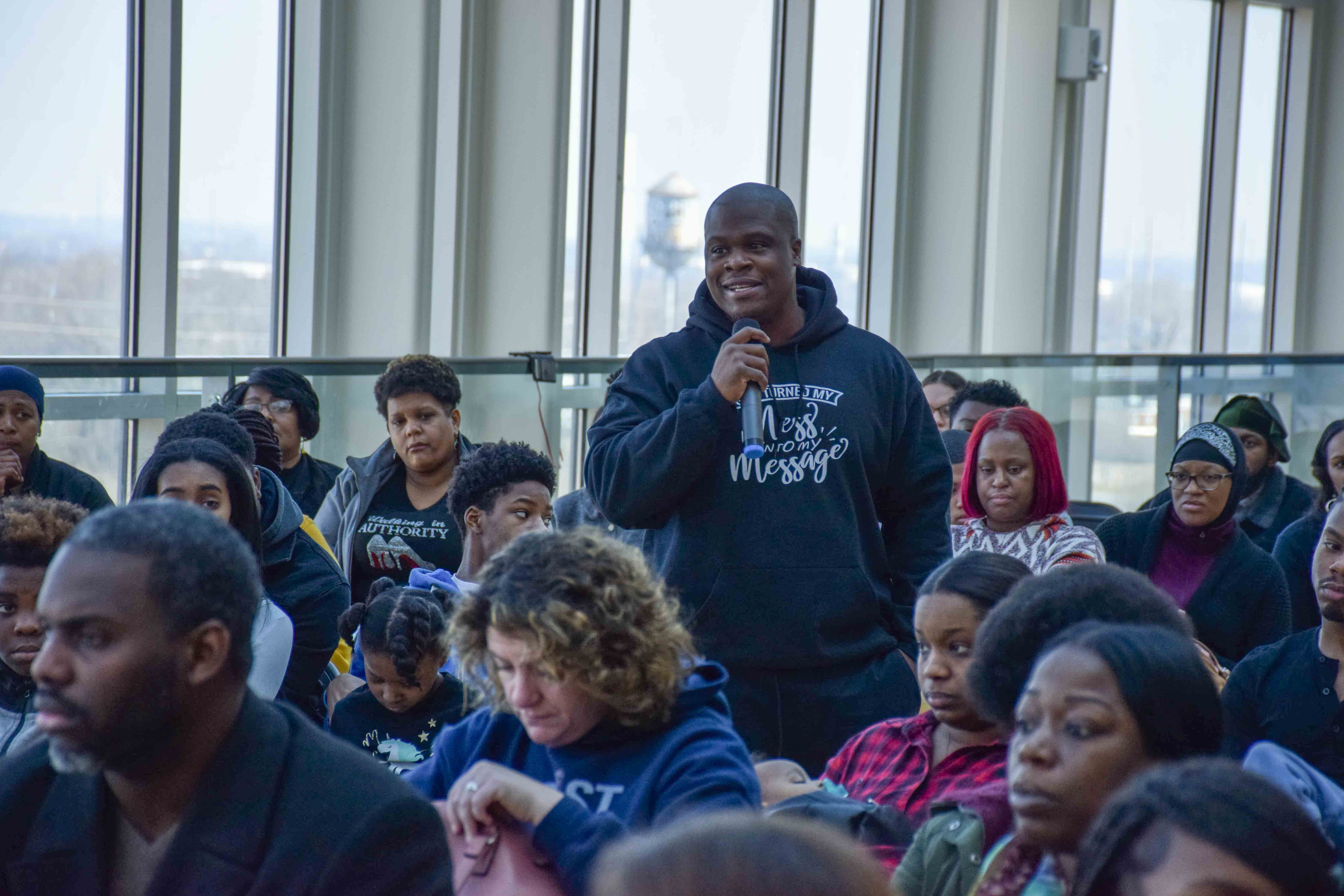
Tony Lewis, Jr. speaks to audience members during “Surviving Mass Incarceration” Panel Discussion Event at Kuumba Academy in Wilmington, Delaware Photo By Wendell Raulston
Unlike Melton, Coley survived mass incarceration from behind the bars. His experience was different as he had to push through the harsh reality of remeeting his little boy, now as a young man. During the panel discussion, Coley explained the most difficult parts about building a stable foundation for a budding relationship. Coley says that many fathers go wrong when they return home and attempt to become ‘friends’ with their children. “After all of these years, your children don’t need another friend, they need a parent…fathers need to fill that void,” said Coley. We asked Coley to give a bit of advice to other fathers who are soon to return home. He wisely responded, “do not deny any past hurt that you may have caused, be consistent and persistent when expressing interest, but most importantly be patient; coming home and re-entering your child’s life is a transition for both.”
This transition starts in the home, but often times transcends into society. Panelists shared that although many issues surrounding mass incarceration could be solved using techniques and programs such as Out of the Ashes, other important issues like job searching and career building often times get overlooked. Programs like Project New Start and The Hope Commission have proven to be successful in helping with the decrease of recidivism for the people of Wilmington and its surrounding community. Nonetheless, upon returning to a criminally intolerant job market, many can’t afford to live in their own neighborhood anymore. “I’d like to see the city of Wilmington cater to its minorities and its underprivileged by reevaluating the specifications for set aside jobs, in order to ensure that there’s ample opportunity for anyone who puts in the effort,” said Coley who’s now a seasoned youth intervention specialist and a successful serial entrepreneur.
Out of the Ashes plans to use the momentum of their stage play to further build a following and create a safe place for children with incarcerated family members. 2019 is looking to be a very progressive year for Coley and Melton, and Wilmington stands behind them every step of the way. To contact Out of the Ashes, please visit their website at http://www.outoftheashesllc.com.
- Out of the Ashes held “Surviving Mass Incarceration” Panel Discussion Event at Kuumba Academy in Wilmington, Delaware
- Out of the Ashes held “Surviving Mass Incarceration” Panel Discussion Event at Kuumba Academy in Wilmington, Delaware
- Out of the Ashes held “Surviving Mass Incarceration” Panel Discussion Event at Kuumba Academy in Wilmington, Delaware
- Out of the Ashes held “Surviving Mass Incarceration” Panel Discussion Event at Kuumba Academy in Wilmington, Delaware
- Out of the Ashes held “Surviving Mass Incarceration” Panel Discussion Event at Kuumba Academy in Wilmington, Delaware
- Out of the Ashes held “Surviving Mass Incarceration” Panel Discussion Event at Kuumba Academy in Wilmington, Delaware
- Coley Harris (left) and Ahmarr (right) perform their play entitled “Out of the Ashes” at Kuumba Academy in Wilmington, Delaware Photo By Wendell Raulston
- Ahmarr delivers monlogue during play entitled “Out of the Ashes” at Kuumba Academy in Wilmington, Delaware
- Ahmarr delivers monlogue during play entitled “Out of the Ashes” at Kuumba Academy in Wilmington, Delaware
- Out of the Ashes held “Surviving Mass Incarceration” Panel Discussion Event at Kuumba Academy in Wilmington, Delaware
- Out of the Ashes held “Surviving Mass Incarceration” Panel Discussion Event at Kuumba Academy in Wilmington, Delaware
- Out of the Ashes held “Surviving Mass Incarceration” Panel Discussion Event at Kuumba Academy in Wilmington, Delaware Photo By Wendell Raulston
- Tony Lewis, Jr. speaks to audience members during “Surviving Mass Incarceration” Panel Discussion Event at Kuumba Academy in Wilmington, Delaware Photo By Wendell Raulston
- Tony Lewis, Jr. speaks to audience members during “Surviving Mass Incarceration” Panel Discussion Event at Kuumba Academy in Wilmington, Delaware
- Patty Harris, Co-Founder of Out of the Ashes , speaks to audience members at Kuumba Academy during “Surviving Mass Incarceration” Panel Discussion



